Toyota Raises Annual Profit Forecast, Nine-Month Profit Jumps Despite Lower Car Sales

Toyota, the world’s largest carmaker by sales, reported 9.2 percent jump in profit in the nine-month period ending December despite selling lesser number of cars due to flagging demand in Europe and Asia. The company also raised its full-year profit forecast due to improvements in its Chinese operations, but kept its revenue expectations unchanged Friday.
The company said in a statement that it expected its net income to rise to 2.27 trillion yen ($19.42 billion) for the year ending in March, from an earlier forecast of 2.25 trillion yen ($19.25 billion). Toyota kept its operating profit forecast unchanged at 2.8 trillion yen ($2.4 billion), compared to analysts' estimates of 3.07 trillion yen ($3.17 billion) in the 12-month period, Bloomberg reported, adding that the carmaker is on track to become the first Japanese company to cross 3 trillion yen ($25.66 billion) in annual operating profit.
"Our Chinese operations have improved, which has increased our profitability. This is why we've raised our profit forecast," Managing Officer Tetsuya Otake said, according to Reuters.
Toyota maintained its sales forecast at 27.5 trillion yen ($235. billion) for the year, amid declines in unit sales in most regions except North America. For North America, the company in fact raised its forecast to 2.87 million from 2.85 million because of higher U.S. demand, Reuters reported.
The company’s shares were trading 1.88 percent lower during afternoon trade on the Tokyo Stock Exchange.
Last month Toyota kept the title of the world's top automaker for the fourth straight year, selling 10.15 million vehicles globally in 2015, with Volkswagen and General Motors in second and third place respectively. Toyota also announced this week that it would discontinue its youth-inspired Scion brand of cars in the U.S., and also bought out the rest of minivehicle unit Daihatsu Motor Co. for about 389 billion yen ($3.33 billion) in an all-stock deal, converting it into a wholly owned subsidiary of Toyota.
On Saturday, Toyota said that it would halt production in its Japanese carmaking factories in February due to shortage of steel parts, following a blast at one of its steel plants earlier this month. The company, which makes about 40 percent of its global output in Japan, said that Friday's outlook did not include the impact of the suspension.
Toyota is said to be looking for alliances with Japanese carmakers as global firms look to reduce the development cost of new cars and try to meet stringent emission standards by forming partnerships. The company is in talks with Mazda Motor to study potential alliances for green cars and other technologies, Bloomberg reported.
© Copyright IBTimes 2025. All rights reserved.





















